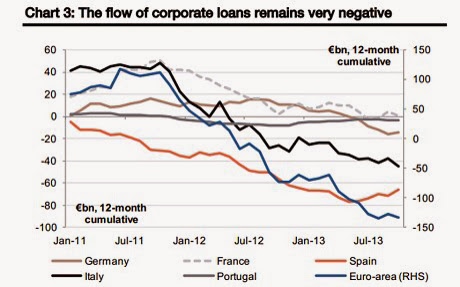The risk of deflation in Europe has become a concern for authorities, economists and journalists. International business editor of the Daily Telegraph, Ambrose Evans-Pritchard, has given a comprehensive view on the matter, including Spain. As it seems austerity inclined Spanish economists are not very interested in doing it.
Europe is in a deflation situation because demand is sunk. The fact that prices fall means that demand is increasingly reducing. Who is the responsible for the demand not to plummet? The ECB. One will say: the ECB cut rates recently! Yes, but it did it too late, as you can be seen in next picture taken from Evans-Prichard:
Money supply is excessively slowing down under the benchmark rate, which should be at 4.5%, according to the ECB. On the other hand, credit to private sector, one of the money supply components, is falling by 2% yearly. However, it is no concern about all of this: when the ECB reduced rates, German authorities got very angry. The Bundesbank voted against and threw up their hands in horror.
Those figures suggest clearly what it is expected ahead: crossing the desert, but with no promise land at the end.
A central bank must avoid negative inflation area and zero interest rate. The later it reacts, the tougher it will be to change direction. However, journalist at El Confidencial Antonio España, seems not to be concerned about that risk. He is only worried about bubbles, and gives a very fine name for fears of deflation. He talks about Apoplitorismofobia …. I would answer him that when prices fall in all countries, and especially corporate credit , there is a reason to worry. It is interesting to look at this picture:
Is it possible a bubble with a sunking credit? I do not think so. It is not a nonsense to being afraid of deflation. What it is really a nonsense is to become indifferent when considering that private credit is going to tighten after the next banking recapitalisation demanded by the ECB.







Be the first to comment on "How to call fear of bubbles? Paranoia maybe?"